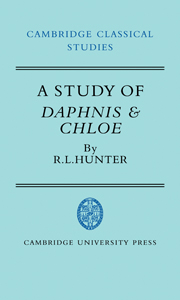Summary
The prose fiction of antiquity has been the subject of increasing scholarly attention in the last twenty-five years, and Daphnis & Chloe has benefited from this general revival of interest. Nevertheless, critical progress has been hindered by the lack of a basic guide to the literary and rhetorical background against which this work was written. The present essay is an attempt to fill that gap. I have tried to combine information of a kind which is usually found in a continuous commentary with an outline of the various interpretative directions in which that information points. About the Origins of the Greek Novel', the problem which has dominated scholarship in this field ever since the publication of Erwin Rohde's magnificent study Der griechische Roman und seine Vorläufer, I have said very little, although Longus' exploitation of the traditions of historiography and comedy serves as a reminder of two major influences on the fiction of later antiquity. My silence on this subject will, I hope, suggest that it is unhelpful to view Daphnis & Chloe as ‘the standard ancient novel’ relocated in a pastoral setting and that a solution to the problem of the origins of the genre as a whole is unlikely also to supply the key to an appreciation of a particular example of the genre. The Greek novels which survive in a manuscript tradition differ from each other so widely in terms of wit, rhetorical skill and narrative coherence that, even after the standard division into pre-sophistic (Xenophon of Ephesus, Chariton) and sophistic (Achilles Tatius, Longus, Heliodorus), it makes very little sense to treat them as though they were almost identical specimens off a production-line.
- Type
- Chapter
- Information
- A Study of Daphnis and Chloe , pp. vii - viiiPublisher: Cambridge University PressPrint publication year: 1983

